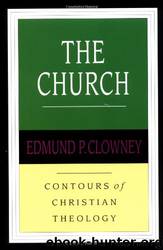The Church (Contours of Christian Theology) by Edmund P. Clowney

Author:Edmund P. Clowney [Clowney, Edmund P.]
Language: eng
Format: epub
Published: 0101-01-01T00:00:00+00:00
12
THE CHURCH IN THE WORLD’S CULTURES
‘You mean to say that God doesn’t want us going on cannibal raids?’
This response in a Bible study of Genesis 9 startled R. Daniel Shaw, a missionary to Papua New Guinea. ‘Not being a cannibal,’ he tells us, ‘I had never considered this passage from that perspective.’ The Papuan saw the implications of the text: God is not pleased when we kill those made in his image. His Samo culture divided people into Monsoon, those who slept in the same longhouse; Oosoo Buoman, their allies; and Ton, those who spoke the same dialect; all others were Hatooman, enemies.
In the climate of modern multiculturalism, meeting the world-views of other cultures has become everyone’s problem. Cultural change now requires us to cross cultural barriers in order to present the gospel across the street.
Christian attitudes to culture
What should be the Christian attitude to the world and its cultures?
As H. Richard Niebuhr and others have shown, very different answers have been given throughout the history of the church. Each has put forward scriptural passages to support its case.
Those who see the world and its culture as a threat appeal to the first letter of John and urge a strategy of avoidance:
Do not love the world or anything in the world … For everything in the world—the cravings of sinful man, the lust of the eyes and the boasting of what he has and does—comes not from the Father but from the world (1 Jn. 2:15–16).
Avoidance is a matter of degree. Even a solitary hermit cannot abstain from all involvement in the world. On the other hand, Christians must simply say ‘No’ to many things in our pleasure-mad culture. Driving horse-drawn carriages on the highways of eastern Pennsylvania, Amish farmers give wide scope to that ‘No’.
Many missionaries have taken the Christ-against-culture position, seeing the tribal or national cultures in which they evangelized as being completely hostile to the gospel. Individual converts, rejected by their own societies, joined their missionary mentors, sometimes in mission compounds where they adopted not only the culture but also the subculture of the missionaries. Since missionaries were, until recently, uncritical of their own culture, their activities promoted the colonialist expansion of the West. As the Third World shook off political control by colonial powers, it continued to resent economic colonialism but gave credibility to another form of Western domination: Marxist ideology.
Potent factors in missionary work, however, widened the horizons of dedicated missionaries. Language-learning meant culture-learning, and carried with it appreciation for the new culture. Seeking to approach people with the gospel, missionaries were also driven to understand better the values and structures of their own culture. The success of Don Richardson in finding powerful cultural analogies for presenting the gospel to tribal cultures led him to believe that every culture has a providentially prepared key that will unlock it for the truth.
Some other church leaders throughout the centuries have argued for an opposite strategy. Instead of withdrawing from the world, the church should join it. Did not the apostle Paul seek to be all things to all men so that by all means he might win some (1 Cor.
Download
This site does not store any files on its server. We only index and link to content provided by other sites. Please contact the content providers to delete copyright contents if any and email us, we'll remove relevant links or contents immediately.
The Lost Art of Listening by Michael P. Nichols(7482)
Why I Am Not A Calvinist by Dr. Peter S. Ruckman(4134)
The Rosicrucians by Christopher McIntosh(3503)
Wicca: a guide for the solitary practitioner by Scott Cunningham(3158)
Signature in the Cell: DNA and the Evidence for Intelligent Design by Stephen C. Meyer(3118)
Real Sex by Lauren F. Winner(3000)
The Holy Spirit by Billy Graham(2933)
To Light a Sacred Flame by Silver RavenWolf(2802)
The End of Faith by Sam Harris(2723)
The Gnostic Gospels by Pagels Elaine(2515)
Waking Up by Sam Harris(2447)
Nine Parts of Desire by Geraldine Brooks(2355)
Jesus by Paul Johnson(2347)
Devil, The by Almond Philip C(2322)
The God delusion by Richard Dawkins(2295)
Heavens on Earth by Michael Shermer(2268)
Kundalini by Gopi Krishna(2168)
Chosen by God by R. C. Sproul(2150)
The Nature of Consciousness by Rupert Spira(2083)
